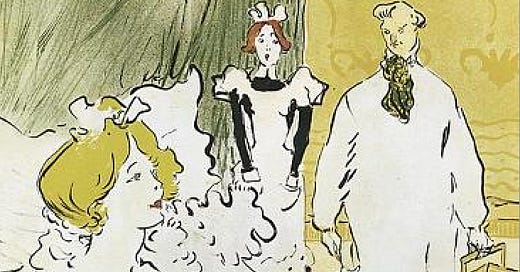Private practice
Last spring, I got COVID again tending a lover who got sick celebrating the birthday of her once lover’s lover at a raucous house party I did not even attend — too sick from my original sin of pre-vaccine illness to kiki. We joke in queer community about the traceable web between us, how dating is just eternal musical chairs, every event a concatenation of hopefully amicable past and future exes, how the heterosexual practice of declaring one’s friends off-limits cannot possibly apply to us. But we’ve long lost the early pandemic habit of notifying each other of exposures or quarantining our contagion; gone the same way as other preventative measures no longer mandated by law or even socially acceptable.
It is easier to remove people at risk in your community than it is reduce our collective risks; to ghost instead of copping to the harm our carelessness causes. I lost a wave of community when vaccines rolled out and the world rolled on in ways my deeply damaged body could not. I lost more last year when I pulled the curtain on the severity of this illness — what it looks like to truly be too sick to function in society, embodying the worst case scenario no one wants to imagine.
The more I learn about viruses, the more horrified I am by how poorly we teach basic immunology or that we don’t maintain institutional prevention measures, even in medical settings or queer spaces that should know better. Instead of true public health, we have mostly private practices — the burden passed down to the individual, who has to choose between social isolation or viral exposure, and later between high risk mediation that was never studied in combination, or tested for safety on the seriously ill.
No one needs another essay lecturing on the queer failure to live up to the legacy of the AIDS survivors we are the community descendants of, or reminders that risk reduction does not need to be all-or-nothing or a declarative identity. But I am sick this week from another, hopefully less dangerous, virus I could not singlehandedly fend off, and I am tired of doing the unpaid work of health and education departments, while public policy fails at both prevention and treatment. I want better for my communities, and my sick friends, and those who have not yet joined us in the land of the ill.
The Impairing Curse is a long-form, serialized experiment in personal essay, science journalism, policy analysis, and poetry. To start at the beginning and read it in order, go to the first essay or read about the aesthetics and labour of illness, the science of salt, and the failures of public health. To support this project, share it online or subscribe. The series is intentionally not behind a paywall, to ensure broad access to patients and timely circulation of information in our evolving public health crisis, but paid subscriptions are welcome.



